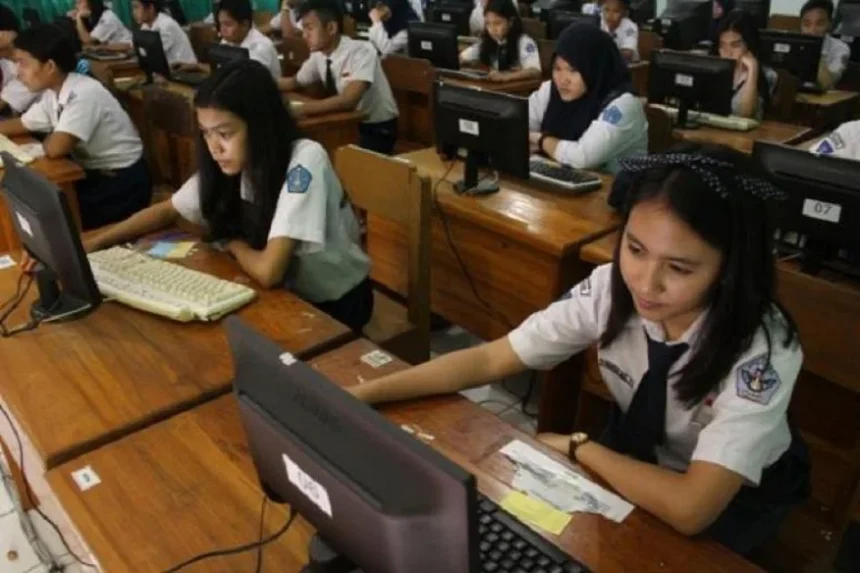The phrase “SMP Mesum” comes from Indonesian usage, combining:
- SMP, which is an abbreviation for Sekolah Menengah Pertama — the Indonesian equivalent of junior high school (roughly ages 12–15),
- Mesum, an Indonesian word meaning “perverted,” “lewd,” or “sexual misconduct.”
So, “SMP Mesum” refers to sexual or lewd incidents involving junior high school students. In Indonesian media, it is often used to describe cases where students or teachers in SMP are suspected or accused of engaging in inappropriate sexual acts, either between students or between a teacher and student.
As seen in recent news:
A case in Grobogan, Central Java involved a female teacher allegedly inviting a student from SMP to engage in sexual acts. The Commission for Child Protection (KPAI) demanded swift legal processing.
Social media and viral local news also carry videos or allegations of SMP students caught in sexual acts (e.g. “Pelajar SMP mesum di bawah jembatan” — SMP student engaging in sexual acts under a bridge).
Because the term involves minors and potential abuse, it touches upon serious legal, ethical, social, and psychological concerns.
How “SMP Mesum” Cases Appear in the News & Social Media
1. Viral Videos & Rumors
Often, alleged “SMP Mesum” scenes are circulated via social media or messaging apps, sometimes with video clips, photos, or hearsay. These can be:
- Footage of a pair in compromising positions (often low resolution or partial)
- Claims of a teacher/student illicit relationship
- Localized gossip sites amplifying unverified claims
Such viral content spreads fast, sometimes before authorities verify facts.
2. Media Reporting & Legal Follow-up
When cases get picked up by mainstream media:
- Local news sites report the allegation, sometimes naming regions, schools, or initials
- Child protection agencies or local police respond, for example KPAI in Indonesia urging faster legal resolution
- Investigations may follow: questioning, collecting evidence, supporting victims
3. Public Outcry & Social Reaction
These cases generate strong public reaction: outrage, debate, victim blaming, blaming educational institutions, demands for stricter laws or enforcement, and sometimes calls for social media censorship or control.
4. Legal Proceedings & Delays
Because of the sensitive nature, legal proceedings may be slow, partly due to evidence difficulties, privacy concerns, or reluctance of authorities. Victims may face stigma, making them reluctant to cooperate.
Legal, Ethical & Child Protection Concerns
Legal Frameworks
In Indonesia and many other countries:
- Sexual acts involving minors are criminal offenses, often with statutory rape, child molestation, or abuse charges.
- Teachers or authority figures have heightened responsibility; relationship with students is viewed particularly severely.
- Child protection laws require special handling of evidence, testimony, and victim support.
Ethical Dimensions
- Teachers or staff engaging in such misconduct violate trust, power boundaries, and professional ethics.
- The informed consent argument does not apply with minors — minors cannot legally consent to such acts.
- Ethical duty demands reporting suspected abuse immediately, protecting victims, and ensuring due process.
Psychological & Social Impact
Victims may suffer:
- Shame, guilt, trauma, anxiety, depression
- Social ostracism or bullying
- Academic decline or dropping out
- Longer term trust issues, relationship problems
Communities may stigmatize victims or families, adding secondary harm.
Privacy & Media Ethics
Media and social platforms have responsibilities:
- Avoid publishing victim identities or detailed personal data
- Avoid sensationalism or unverified claims
- Use disclaimers and verify sources
Failing to do so can cause re-victimization or defamation.
Challenges in Handling SMP Mesum Incidents
Evidence & Verification Difficulty
- Videos or images may be tampered or ambiguous
- Victims or witnesses may be reluctant to speak
- Lack of forensic capacity in some regions
Victim Reluctance & Stigma
- Fear of judgment, shame, or community backlash
- Pressure to stay silent, especially in conservative settings
Institutional Resistance
- Schools may try to cover up or protect reputation
- Authorities may delay or downplay cases
Balancing Transparency & Privacy
- The public wants accountability, but revealing too much can harm victims
- Sensational media can worsen trauma
Enforcement & Punishment Consistency
- Laws may be strong on paper but weak in practice
- Sentences, if given, might not deter future cases
What Should Be Done: Protection, Prevention & Response
Here are recommended strategies and actions for communities, schools, governments, and individuals:
1. Strong Legal Enforcement & Child Protection Agencies
- Ensure fast, impartial investigation and prosecution
- Strengthen agencies like KPAI (Indonesia) to monitor and support
- Enforce laws strictly for offenders, especially authority figures
2. Education & Awareness
- Teach students, parents, teachers about sexual abuse prevention, consent, boundaries
- Awareness campaigns to reduce stigma and encourage reporting
- Training for school staff to spot signs of abuse
3. Safe Reporting Channels & Support for Victims
- Confidential hotlines, child protection units
- Provide psychological, medical, legal support to victims
- Guarantee anonymity and protection from retaliation
4. Media Guidelines & Responsible Reporting
- Media should avoid sensationalizing, avoid naming minors, verify sources
- Social media companies should take down unverified, abusive content
- Use trigger warnings and responsible language
5. Institutional Accountability in Schools
- Schools must adopt codes of conduct, background checks, monitoring
- Zero tolerance policies for sexual misconduct
- Transparent procedures when allegations arise
6. Community & Cultural Change
- Engage religious, cultural, community leaders to support victims and shifts in mindset
- Reduce victim blaming, silence, and stigma
- Encourage open discussion of healthy sexuality in safe spaces
Conclusion
“SMP Mesum” refers to sexual misconduct involving junior high (SMP) students, a deeply troubling phenomenon reported in Indonesian media and social platforms. These incidents raise grave legal, ethical, psychological, and social issues.
While viral rumors and sensational videos may capture public attention, meaningful change demands strengthened laws, child protection mechanisms, education, victim support, responsible media, and school accountability.
Only with holistic action — from government, schools, communities, and individuals — can such abuses be prevented and handled justly, and victims protected and healed.








